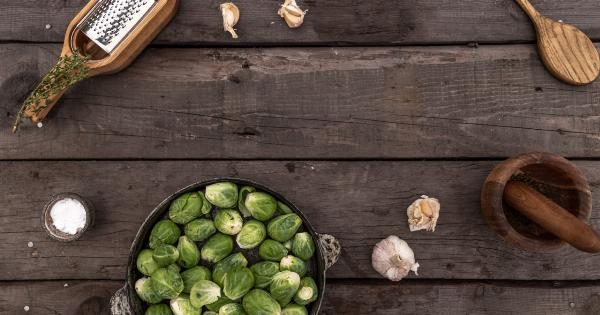Brussels sprouts, those tiny cabbage-like vegetables, have always been a subject of great debate among food enthusiasts. While some people absolutely love their unique taste and texture, others despise their bitter and pungent flavor.
This love-hate relationship with Brussels sprouts has sparked numerous discussions and divided opinions. In this article, we will delve into the reasons behind this divide and explore various aspects of this controversial vegetable.
The Origin and History of Brussels Sprouts
Brussels sprouts, scientifically known as Brassica oleracea var. Gemmifera, belong to the Brassicaceae family. The vegetable is believed to have originated in Ancient Rome and was later cultivated in what is now modern-day Belgium.
Hence, the name “Brussels” sprouts. The popularity of Brussels sprouts spread throughout Europe during the medieval times and eventually reached North America in the 18th century.
Culinary Uses
Despite the mixed reception, Brussels sprouts have found their way into various cuisines worldwide. They are often enjoyed as a side dish, steamed, boiled, or roasted.
The unique taste and texture of these vegetables make them a perfect accompaniment to hearty meat dishes or a delightful addition to vegetarian and vegan meals. Their small size also makes them suitable for pickling and incorporating into salads. Chefs and home cooks alike have experimented with diverse recipes to bring out the best flavors of Brussels sprouts.
Nutritional Value
Brussels sprouts are not just tasty; they are also packed with essential nutrients. These tiny greens are an excellent source of vitamins C, K, and A. They are also rich in dietary fiber, folate, and antioxidants.
Incorporating Brussels sprouts into your diet can contribute to maintaining a healthy immune system, supporting bone health, and promoting digestion.
The Love for Brussels Sprouts
For those who adore Brussels sprouts, it goes beyond just appreciating their nutritional value. They are captivated by the complex flavors that these cruciferous veggies offer.
When cooked correctly, Brussels sprouts have a slightly sweet and nutty taste with a tender yet slightly crisp texture. Fans of Brussels sprouts love the way they can be transformed into a delicious dish through various cooking methods like sautéing, grilling, or even deep frying.
The veggie lovers see them as a versatile ingredient that can be incorporated into a wide range of recipes, from comforting winter stews to refreshing summer salads.
The Hate for Brussels Sprouts
On the other end of the spectrum, Brussels sprouts face strong opposition from a significant number of individuals. The intense bitterness and strong aroma of these vegetables can be off-putting for those who dislike them.
Brussels sprouts contain a compound called glucosinolate, which gives them their distinct flavor. However, some people have a heightened sensitivity to this compound, causing them to find the taste overwhelming and unpleasant. Furthermore, improper cooking techniques can amplify the bitterness and make Brussels sprouts unpalatable.
Overcooking or undercooking can ruin the delicate balance of flavors, leading to a negative experience.
How to Make Brussels Sprouts More Palatable
If you find yourself on the hate side of the Brussels sprouts debate, there are still ways to give them a second chance. The bitterness can be mitigated by pairing Brussels sprouts with complementary ingredients.
Adding a touch of sweetness, such as maple syrup or honey, can help balance the flavors. Combining them with tangy sauces like balsamic reduction or lemon juice can also cut through the bitterness. Roasting Brussels sprouts with olive oil and spices can enhance their natural flavors and bring a caramelized touch.
Exploring different cooking methods and flavor combinations might just change your perception of these much-maligned veggies.
The Health Benefits of Brussels Sprouts
Despite the divided opinions, Brussels sprouts offer an array of health benefits. The vegetable’s high fiber content promotes healthy digestion and can help regulate blood sugar levels.
Brussels sprouts are also known for their potential cancer-fighting properties. Their abundance of antioxidants, such as kaempferol, may reduce the risk of chronic diseases and inflammation. Additionally, the vitamin C in Brussels sprouts supports collagen production and strengthens the immune system.
Incorporating this vegetable into your diet can contribute significantly to your overall well-being.
Common Brussels Sprouts Myths
Over the years, several myths and misconceptions about Brussels sprouts have circulated, further polarizing opinions. Let’s debunk some of these myths:.
Myth 1: Brussels Sprouts Are Baby Cabbages
Contrary to popular belief, Brussels sprouts are not baby cabbages. While they belong to the same family as cabbage, each has its distinct characteristics and flavor profile.
Brussels sprouts grow as small buds along a thick stem, whereas cabbages form a single large head.
Myth 2: Brussels Sprouts Are Always Bitter
Although Brussels sprouts can have a bitter taste, not all of them do. The bitterness varies depending on factors such as the specific variety, freshness, and cooking technique.
Selecting fresh Brussels sprouts and avoiding overcooking can significantly reduce the bitterness.
Myth 3: Brussels Sprouts Have No Nutritional Value
This myth couldn’t be further from the truth. Brussels sprouts are a nutritional powerhouse, providing an array of vitamins, minerals, and antioxidants. They are a low-calorie food that brings numerous health benefits to the table.
Conclusion
Brussels sprouts continue to evoke strong emotions and divided opinions among individuals. While some revel in their unique taste and versatility, others struggle to overcome the perceived bitterness.
However, it is essential to approach this love-hate relationship with an open mind and explore different cooking techniques and flavor combinations. Perhaps by giving Brussels sprouts another chance, one can discover a newfound appreciation for these nutritional powerhouses that have enriched culinary traditions worldwide.





























